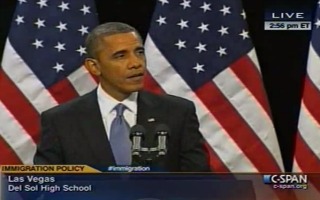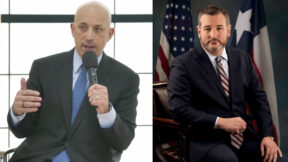Obama Says Nothing In Presser, Saves Immigration Reform
 I confess I expected President Barack Obama to continue his lamentable tradition of scuttling bipartisan deals in Congress by taking to the microphone today in Nevada and casting aspersions on his political opponents. Obama pioneered this tactic during the debt ceiling negotiations in 2011 and perfected it during the fiscal cliff negotiations in December of last year. Today, however, the president showed some restraint. He smartly neglected to attribute straw man position to his Republican adversaries, which would have made them combative, defensive and predisposed to oppose the president’s legislative objectives. Obama decided, perhaps last minute, to heed the pleas of Congressional Democrats to back off and let Republican support coalesce around a bipartisan framework on immigration reform taking shape in the Senate. This is one occasion where I have never been happier to be dead wrong about the president.
I confess I expected President Barack Obama to continue his lamentable tradition of scuttling bipartisan deals in Congress by taking to the microphone today in Nevada and casting aspersions on his political opponents. Obama pioneered this tactic during the debt ceiling negotiations in 2011 and perfected it during the fiscal cliff negotiations in December of last year. Today, however, the president showed some restraint. He smartly neglected to attribute straw man position to his Republican adversaries, which would have made them combative, defensive and predisposed to oppose the president’s legislative objectives. Obama decided, perhaps last minute, to heed the pleas of Congressional Democrats to back off and let Republican support coalesce around a bipartisan framework on immigration reform taking shape in the Senate. This is one occasion where I have never been happier to be dead wrong about the president.
CNN reported on Monday that the Congressional Hispanic Caucus specifically requested the White House to stand down and allow Republican Senators and Congressmen, warming to the possibility of a major deal on immigration reform, to entertain the proposals put forward by the Gang of Eight. “It’s a tricky thing. We want him to lead, but Republicans are in a difficult position,” one unnamed Democratic source told CNN. This time, the president complied.
This is a major, though underreported, development. It may have preserved the political will that seems to exist in Congress for a broad reform package that includes a pathway to citizenship for many illegal immigrants while strengthening border security:
My fears that the president did not truly want progress on immigration reform, but would rather seek to isolate his opponents and preserve their opposition to comprehensive reform as a political cudgel for his party’s electoral purposes, were not unfounded. Obama has set dubious precedent after precedent of wrenching legislative defeat from the jaws of victory.
On July 25, 2011, with just days to go before the debt ceiling limit was reached on August 2 of that year, President Barack Obama delivered a prime time address to the nation warning of the consequences of the House Republican plan to avert the catastrophe of default on the nation’s debt.
The president did not offer a concrete plan of his own to avert the crisis, but endorsed Sen. Harry Reid’s (D-NV) proposal which he knew was unpalatable to Republicans. The president’s speech hardened the positions of partisan members of Congress. The framework of a bipartisan deal was scuttled. What was ultimately passed was not favorable to the White House and amounted to a Republican victory – one that Obama’s supporters on the left were roiled over. The episode amounted to the most significant defeat of Obama’s presidency to date:
The president had learned his lesson.
With the fiscal cliff crisis looming in December of last year, Congressional Republicans and Democrats were beginning to come to the center (Republicans on revenues, Democrats on structural entitlement reforms) for a deal that would resolve the matter on politically favorable grounds for both parties. Enter the White House, which insisted upon a number of provisions to resolve the deal which set negotiations back weeks – including the ceding of the control of the debt ceiling limit from Congress to the executive branch.
Recall that in late 2012, fresh off his reelection victory, the president held a White House press conference in which he implied that the only reason Republicans opposed that deal was due to a personal animus towards him:
The damage was done. The framework of the deal Congress was flirting with collapsed. Obama placed himself at the center of negotiations and ensured that any deal worked out after the nation had gone over the cliff would be one that bore his fingerprints. It was a suboptimal deal, however, that only put a number of economic crises off for a handful of weeks.
The president could have gone back to this well today. He could have joined the progressive members of Congress by insisting, from the podium, that any immigration reform package allow for lesbian and gay couples to seek family protections. The president does support that, and it would be politically foolish for Congressional Republicans to oppose such a provision. Some members of the Congressional Republican Conference do, however, and it is an easy position to demagogue.
If he so chose, Obama could have alienated many Congressional Republicans by inferring their bigotry. Politically, his party would have benefited from going for the throats of the most recalcitrant Republicans. He did not. It was a moment of prudence that preserved the will to pass a reform plan which may end up being central to his legacy.
Obama’s restraint today will ultimately prove good for him and good for the nation.
> >Follow Noah Rothman (@NoahCRothman) on Twitter
This is an opinion piece. The views expressed in this article are those of just the author.





Comments
↓ Scroll down for comments ↓